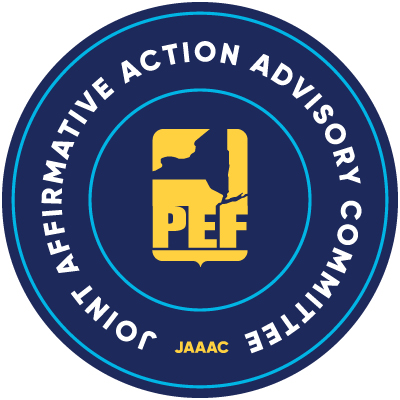 May 17, 2024 — PEF members may not be aware that when they face discrimination in the workplace, there are avenues that they can take to find justice and protection. One of the ways PEF members can get the support they need is from PEF’s Joint Affirmative Action Advisory Committee (JAAAC).
May 17, 2024 — PEF members may not be aware that when they face discrimination in the workplace, there are avenues that they can take to find justice and protection. One of the ways PEF members can get the support they need is from PEF’s Joint Affirmative Action Advisory Committee (JAAAC).
Article 36 of the PEF Contract provides a joint state and PEF committee that “shall develop appropriate recommendations on matters of mutual interest in the area of Equal Employment and Affirmative Action.”
Employment discrimination comes in many forms and is based on protected classes, like race, gender, sexual orientation, and age.
To help deal with cases of discrimination when they arise, PEF works with Eric Josey, a retired New York City Police Officer and Employment Discrimination Specialist who now works as a consultant. Josey got his start while working as an officer, when he helped a fellow officer get her job back after she was wrongfully terminated.
Josey worked with PEF members — especially members at the Department of Corrections and Community Supervision (DOCCS) — to resolve discrimination cases for many years.
When the committee needed to hire a consultant, they at first sought the help of attorneys to bolster the committee’s abilities. However, Josey answered the Request for Proposal sent by PEF and was officially hired in 2020 and has been working with the committee since.
“PEF is the only union that has been taking a strong role against employment discrimination, the only union that has a plan to deal with employment discrimination,” said Josey. “And I am happy to lend my services and support to PEF members.”
PEF Executive Board Member and assistant chair of the JAAAC Tamara Martin agrees with Josey. Other unions, according to Martin, are not taking on the fight against discrimination for their members the way PEF is.
“I’m glad that we are able to do this for our members,” said Martin. “I think it is really important to stand up for our members and fight for our members whenever possible. For us to be able to help them speaks to who we are as a union and to the leadership of President Spence.”
The committee has been pleased with Josey’s work and the time he takes to make sure members have a resource when faced with employment discrimination.
“Eric does a lot of work with the committee and for our members, we ask a lot of him,” said Martin. “But he answered the call, and he has a good track record.”
PEF Retiree Charles Roland is also a member of the JAAAC. He said that Josey’s work has breathed life back into the committee. Thanks to Josey, the committee has a resource to understand policies, laws and the intricacies of complaints.
“He has been an essential part of this committee and delivers clear, concise opinions,” said Roland. “It is due to his involvement and knowledge that we are now a fully active and relevant committee.”
Employment discrimination is a difficult topic, and most people do not know or recognize it when it happens. However, Josey says, many employees do experience it in the workplace.
“A lot of the time, there is often one person at a location with a long history of tolerated behavior,” he said.
While bullying may not always fall into employment discrimination, the two can be related if the bullying falls into a protected class. Sexual harassment can also be a form of employment discrimination.
“I’d say about 8 times out of 10, we see bullying as part of employment discrimination,” said Josey.
Whenever possible, Josey recommends that members should try to resolve the issue on their own before reaching out. Once they reach out, Josey said: “It is going to get worse before it gets better.”
When tackling employment discrimination cases, the focus is typically on “probable cause.” If an employee feels that they have been discriminated against and a complaint is filed, the State Division of Human Rights and the United States Equal Employment Opportunity Commission both must see if the complaint meets the threshold for probable cause. If there is a case, then it leads to a public hearing or lawsuit.
“Most cases are settled before a public hearing of probable cause is found,” Josey said.
The process for PEF members begins with field representatives. If a member feels that they have been discriminated against at their workplace or agency, they should first contact their field representative If they don’t know who that is, call your PEF regional office and you’ll be directed to them. From there, a complaint form is filled out and given to Josey, who reviews it and writes a consultation report.
For members who feel they have a case, it is important to gather supporting documents to build a case. Some employees wait to file their cases and often exceed the statute of limitations. In New York State, that time limit is one year. At the federal level, it is 300 days.
Since Josey has been consulting with PEF, there has been a significant increase of probable cause findings of discrimination after an investigation by the New York State Division of Human Rights.
Martin, Roland and Josey are hopeful that members who are experiencing discrimination will take advantage of the services the committee offers and Josey’s expertise.

